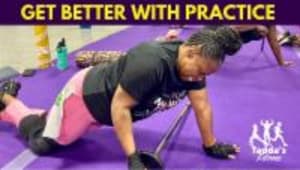
October 28, 2022 "Get Better With Practice"
I often hear, “You make it look so easy”. In my head I say, “They didn’t see how long and hard I had to practice!”
If you’re trying to get better at something, just making your body tired isn’t going to help you do that. You need to break the skill down into smaller parts and learn by practicing.
This week a client in boxed me after her Runday Monday and said.
Tasha! OMG, I’m amazed at how the run got better, it seemed impossible back in August. Now I can run longer, breathing better, and more energy. (It’s still not easy) let’s be clear! LOL
Makes me wonder what else I thought was impossible. Ready to apply this logic to other areas of my life. Your coaching and training is truly a gift from God, thank you, thank you🤩.
We all know learning anything requires practice.
When this client first started the Bootcamp everything was a challenge. She was just “working out”. As she continued to come to Runday Monday her runs turned into practices. Her body got conditioned. She developed muscle memory. Her running is still a challenge because she’s now running at a faster, steady pace. If she continues to run at this rate she will only get better, faster, run longer, and develop amazing endurance.
Just think, you can’t learn the piano by smashing the keys a bunch of times. You have to sit and practice over and over. And when you learn enough to be halfway decent, you still have to keep practicing if you want to get better. And like my client when your reach the halfway decent mark, you start to feel really good.
It’s just common sense.
For some reason, though, when it comes to learning physical skills people forget this completely. They think getting a “good workout” is the only way to make physical improvements. But if you are trying to learn a physical skill, you must repeat the moves over and over until you develop muscle memory fibers and the movements become second nature, like snapping your fingers.
In this article I want to talk about the differences between working out and practicing and why you should focus on one versus the other.
What is practice?
When you are starting to learn a new skill, practicing the components of that skill over and over is what allows you to make the progress you want.
Practice requires focusing on the quality of your movements, with less intensity than you would with a traditional work out. That doesn’t mean practice isn’t challenging or taxing, it’s quite the opposite. For many people, slowing down and concentrating on the details of a movement can be more challenging than pushing as hard as possible, tiring yourself out.
The key is to use this time to focus on the process rather than the outcome. This is the hardest part because we want instant results and get discouraged easily when we don’t see them.
For example, rather than setting a goal of banging out 15 push-ups, slow down your movements and focus on practicing the parts of the push-up you most struggle with. The number of reps doesn’t matter, it’s the method of learning the details of the exercise that make the difference. So, start practicing your push-ups by doing planks (the upward part of a push up). This takes mindfulness, but it is the best way to learn how to improve your push-ups.
Now, if your primary goal is to burn calories or “get a good workout in”, then go for it. But when it comes to learning physical skills or improving specific attributes, practice is the preferred approach. It’s necessary to getting better.
You may have experienced this before. For example; during a workout, if your trainer asked you to do the splits and you can barely touch your toes, could you just flop down and do it? NO! However, if the trainer gives you the tools to practice over time and you do them, you can become flexible and learn to do the splits.
This will be cheesy for me to say but “Practice makes perfect or at least progress”. If you want to get better at a particular skill, or build attributes that will help you achieve your physical goals, you’ll need to practice, practice, practice.
With guidance, your continued practice will lead toward improved abilities and greater confidence in those abilities. Over time that practice will add up to a better physical foundation and longer lasting results with less injuries. No Mess



